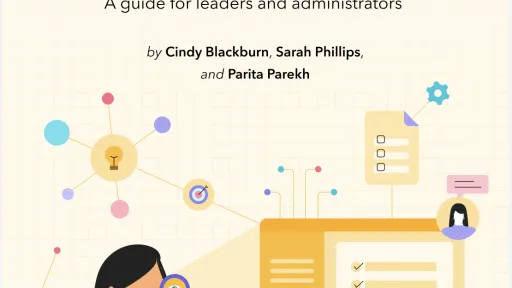Sharing Successes and Overcoming Challenges
Join ATLIS for a community-driven discussion on AI in independent schools, hosted by Maggie Renken, PhD, Director of Modern Learning at Rabun Gap-Nacoochee School. This session offers a platform for tech leaders to share their experiences, from successes in implementing AI tools to the challenges they’ve faced along the way.
Whether you’re just starting with AI or already integrating it into your school’s systems, this meet-up is the perfect space to exchange ideas, ask questions, and learn from your peers. Let’s collaborate to navigate the evolving landscape of AI in independent schools together!
Takeaways
-
AI Literacy is Key
AI literacy is crucial for both students and teachers. Schools need to prioritize teaching responsible AI use, understanding how AI works, and recognizing potential biases in AI systems.
-
Practical Applications of AI in Schools
Schools are using AI tools in diverse ways, including for research, writing assistance, generating feedback, and even creating images for vocabulary lessons. These applications demonstrate AI's potential to support both teaching and learning.
-
Importance of Incident Response Plans
With the rapid development and access to AI tools, schools must have plans in place to address unforeseen issues. Incident response plans are critical for managing potential challenges and ensuring responsible use of AI.
-
Transparency with Parents
It’s essential for schools to communicate openly with parents about the use of AI in classrooms. Transparency helps address concerns and ensures that everyone understands how AI is being integrated into education.
-
Enhancing Teaching with AI
AI tools can enhance teaching by providing more personalized feedback, helping teachers create engaging lessons, and supporting individualized learning experiences for students.
-
Hands-On AI Learning for Students
Hands-on activities and simulations are effective for teaching students about AI concepts. Tools like the "teachable machine" and activities that simulate machine learning processes help students understand AI mechanics and identify biases.
-
Ethics and AI Discussions
Discussing the ethical implications of AI with students is vital. Conversations about bias, responsible AI use, and the societal impact of AI help students develop critical thinking and awareness.
-
Streamlining Teacher Tasks
AI can assist teachers with tasks like writing report card comments, allowing them to focus more on providing personalized feedback and engaging directly with students.
-
Adapting to Evolving AI in Education
The use of AI in education is continually evolving. Schools need to stay informed about new developments, adapt their policies as necessary, and engage in ongoing conversations about best practices for AI integration.
-
Resources for AI Integration
There are many resources available to help schools navigate AI integration. Organizations like ATLIS, the Office of Educational Technology, and AI4K12 offer toolkits, case studies, and guidance to support schools in implementing AI effectively.
Resources
- AI4K12: An organization offering ideas and activities related to AI in educatio…
- The AI-Savvy Leader: A book discussing skills and dispositions for the LS stude…
- Empowering Education Leaders: A Toolkit for Safe, Ethical, and Equitable AI Int…
- Parents Sue After School Disciplined Student for AI Use: Takeaways for Educator…
- ATLIS/Toddle in person AI event: An in-person event on AI in education hosted b…
- Teachable Machine: A Google tool for creating machine learning models.
- Outcomes based contracting: A resource from Southern Education on outcomes-base…
- ATLIS AI Tool Evaluation Instrument and Case Studies: A resource for evaluating…
- ATLIS Vendor vetting: A resource on vetting AI vendors in education.


